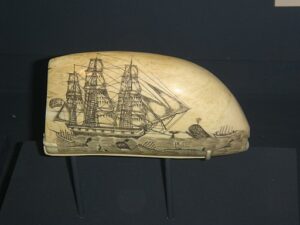REGISTER HERE: https://www.marylandnature.org/scrimshaw-workshop-for-kids/
When you think scrimshaw, images of whaling ships may come to mind. However, the art of scratching images into materials as art can be traced back throughout human history and prehistory. Nate Salzman, Education and Exhibit Specialist from the Jefferson Patterson Park and Museum will share with us the history of scrimshaw and then we will learn how to take simple materials (bone, and ink), simple tools (sandpaper and scribe) and turn them into something simply stupendous ….. Scrimshaw! No experience is necessary. If you can draw a straight line, you can scrimshaw.
This session is open to children aged 10-17 (there is an adult session later on the same day). SPACES are limited. At the time of this posting, masks are optional. This protocol may be changed at any time based on evolving public safety. Cancellations prior to one week before the start of the class will incur a $5 processing fee. Within a week, no refunds will be issued.
The origin of the word “scrimshaw” is somewhat obscure, but most scholars agree that it probably came from an Old Dutch word which means “a waste of time.” A “scrimshander” was someone who never got much done. Today that word is used to identify etching or carving of bone or other natural materials and is recognized as an American folk art.
The intersection of art and science has been a foundational pillar of NHSM since its founding in 1929
REGISTER HERE: https://www.marylandnature.org/scrimshaw-workshop-for-kids/

